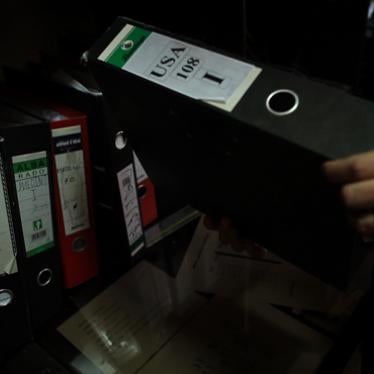There have been repeated claims of UK complicity in the alleged torture of individuals detained abroad. The government’s latest move in the saga does not suggest a desire to get to the bottom of them.
In July 2010, the British prime minister, David Cameron, made a stirring statement to Parliament about his determination to get to the bottom of allegations of UK complicity in overseas torture and rendition. This was vital, Cameron insisted, because ‘[t]he longer these questions remain unanswered, the bigger will grow the stain on our reputation as a country that believes in freedom, fairness and human rights’.
Fast forward to December 2013. Ken Clarke, minister without portfolio, returned to Parliament on the last day of its year to say that the government was finally publishing the incomplete report of the shelved inquiry into the issue by the retired judge Sir Peter Gibson. The report itself consists of nothing more than a series of unanswered questions, albeit suggestive ones. And, despite clear promises from the government to organise a second judicial inquiry, Clarke announced that the matter would instead be passed to the Intelligence and Security Committee (ISC), which has a track record of failing to hold the security services to account. Hardly surprising that some NGOs have begun to use the term ‘whitewash’.
How did we get from the cautious optimism of July 2010 to the cynical resignation of December 2013? And does it really matter?
Let’s recall the abuses that led to demands for an inquiry.
Zeeshan Siddiqui, a British citizen, was arrested in Pakistan in May 2005, on suspicion of involvement in terrorism. He was deported to the UK on January 2006. During his detention in Pakistan, Siddiqui said, he was repeatedly beaten, chained, injected with drugs and threatened with sexual abuse and further torture.
Pakistani security officials confirmed to Human Rights Watch (HRW) that Siddiqui’s arrest had been based on a tip-off from the British intelligence services and come at their request. The Pakistani sources indicated that British intelligence agents had been aware at all times that Siddiqui was being ‘processed’ in the ‘traditional way’ and the British were ‘effectively’ interrogating Siddiqui, even as Pakistan's Intelligence Bureau ‘processed’ him. HRW published a report detailing UK complicity in the abuses against Siddiqui and four other men in Pakistan between 2004 and 2007. No one has ever been held to account for them.
Another episode involved Binyam Mohamed, a British resident detained and tortured in Pakistan and, with the involvement of the US government, in Morocco. He was later sent to Afghanistan and then to Guantanamo, where he was again subjected to ill-treatment. When he pursued legal action against the UK government and officials in the British courts because of their knowledge of his torture and rendition and failure to take action to prevent it, the then Labour government fought tooth and nail to block publication of several paragraphs of a High Court ruling in his case. The government contended that, since the US had given the UK the information in confidence, its publication would harm relations with Washington.
The 2008 High Court ruling makes clear that the UK security services were aware as early as 2002 that he was being subjected to abuse in detention and unlawful detention. When the Court of Appeal ruled that the redacted paragraphs should be published, the government’s real motivation for opposing publication became clear:
It was reported that combined with the sleep deprivation, threats and inducements were made to him. His fears of being removed from United States custody and ‘disappearing’ were played upon … [T]he reports provided to the SyS [the UK Security Service, MI5] made clear to anyone reading them that BM [Binyam Mohamed] was being subjected to the treatment that we have described … Although it is not necessary for us to categorise the treatment reported, it could readily be contended to be at the very least cruel, inhuman and degrading treatment of BM by the United States authorities.
No one has been held to account for his torture and rendition. A criminal investigation by Scotland Yard into MI5 involvement in his case was shelved in January 2012—together with a second investigation into alleged MI6 involvement in another case at a US airbase in Afghanistan in 2002—without any suspects being charged. Mohamed’s civil action against the UK government and officials was settled by the government in 2010 for an undisclosed sum, along with 11 other cases brought by former Guantanamo Bay detainees.
Perhaps the clearest evidence of UK involvement in torture and rendition emerged in September 2011, in the aftermath of the uprising in Libya. HRW researchers discovered documents in Tripoli indicating that MI6 had been involved in the detention of a Libyan opposition figure, Sami Mostefa al-Saadi, along with his wife and children, in Hong Kong in March 2004 and in the rendition to Libya and subsequent torture of another Libyan opposition figure, Abdul Hakim Belhaj.
After almost two weeks in detention, al-Saadi and his terrified family were forced on to a plane to Egypt and later taken to Libya, where they were handed over to the Gaddafi government, which was known to be abusive. His wife and children were detained for two months in Libya before being released. Al-Saadi was detained for six years. During the first 18 months of his detention, he said, he was repeatedly tortured, including beatings and electric shocks.
Criminal investigations by Scotland Yard continue. A civil suit by al-Saadi against the UK government was settled out of court in December 2012 for £2.3 million. Belhaj offered to drop his suit for symbolic damages of £3 and an apology, if the government would admit liability. It refused and on December 20, 2013 the High Court ruled that the case could not be heard on the ground that it would be harmful to relations with the US, despite being ‘potentially well-founded’.
In short, we have clear and strong evidence of British involvement in torture and abuse, for which the British courts (criminal and civil) have yet to deliver justice.
Which brings us back to the Gibson Inquiry. HRW welcomed the decision to hold an Inquiry. We met Sir Peter and the other panel members to offer our assistance so that it could carry out its work in the most effective way possible. The inquiry did not begin investigations straight away because the government insisted that the civil and criminal investigations had to be resolved first.
But by July 2011, when the inquiry’s protocol and terms of reference were published, it was clear that the government was unwilling to give the inquiry the powers and independence needed to get to the truth. As a result the NGOs, including HRW, and lawyers representing former detainees decided to withdraw their co-operation from the inquiry, which suffered two key defects.
First, members of the security services (with the exception of the MI5 and MI6 chiefs) were to give evidence behind closed doors. That meant there could be no meaningful opportunity for those who had been subjected to torture, rendition or illegal detention and the groups that had documented those abuses to challenge the official version of events. It was likely in those circumstances that the inquiry would be denied the full picture and unable to identify all relevant evidence.
Second, the Inquiry wasn’t authorised to decide what documents or evidence to publish—that power rested with the government. While the inquiry could argue for publication, the government had wide grounds for refusal, including preserving diplomatic relations. The cabinet secretary was given the final say.
Whether because of the stance of the NGOs and the lawyers or for the stated reason (the fresh criminal investigations into the two Libya rendition cases discussed above), or both, the government announced in January 2012 that it was shelving the Gibson inquiry. The then justice secretary, Ken Clarke, told Parliament that that it was committed to holding a second ‘independent judge-led inquiry once all police investigations have concluded, to establish the full facts and draw a line under these issues’. Clarke also said the government had asked the Gibson inquiry to produce a report of its preparatory work.
That report was completed and sent to the prime minister in June 2012. But it was not published until December 2013. Looking at the report, the delay is hard to understand. Several paragraphs were apparently redacted but the report is essentially a list of questions which merit further investigation. Some of the questions are sharp and underscore the importance of a future investigation.
The publication of the report was accompanied by disappointing news. Rather than honouring its promise to hold a second independent, judge-led inquiry, the government instead handed responsibility to the ISC, a body criticised by the Parliamentary Human Rights Committee in 2009 for its failure to provide ‘proper ministerial accountability to Parliament for the activities of the Security Services’. While a second inquiry has not been ruled out, it is unlikely to happen in the current parliament (perhaps an explanation for the delayed publication of the report).
The ISC has slightly stronger powers than it did in the last decade. But it remains more beholden to the prime minster than to Parliament—and it is no substitute for an independent judicial inquiry.
Little wonder that the UN experts on torture and on rights and counter-terrorism issued a joint statement expressing concern about the decision, noting that the ISC’s investigation was ‘likely to suffer from many of the same procedural shortcomings’ as the Gibson inquiry.
In May 2013, the UN Committee Against Torture reviewed UK compliance with the Convention Against Torture. Its recommendation to the government could not have been clearer: ‘[E]nsure that the new inquiry is designed to satisfactorily address the shortcomings of the “Detainee Inquiry” identified by a broad range of actors.’ If the British government is serious about removing the stain on its reputation, it should heed that advice.








